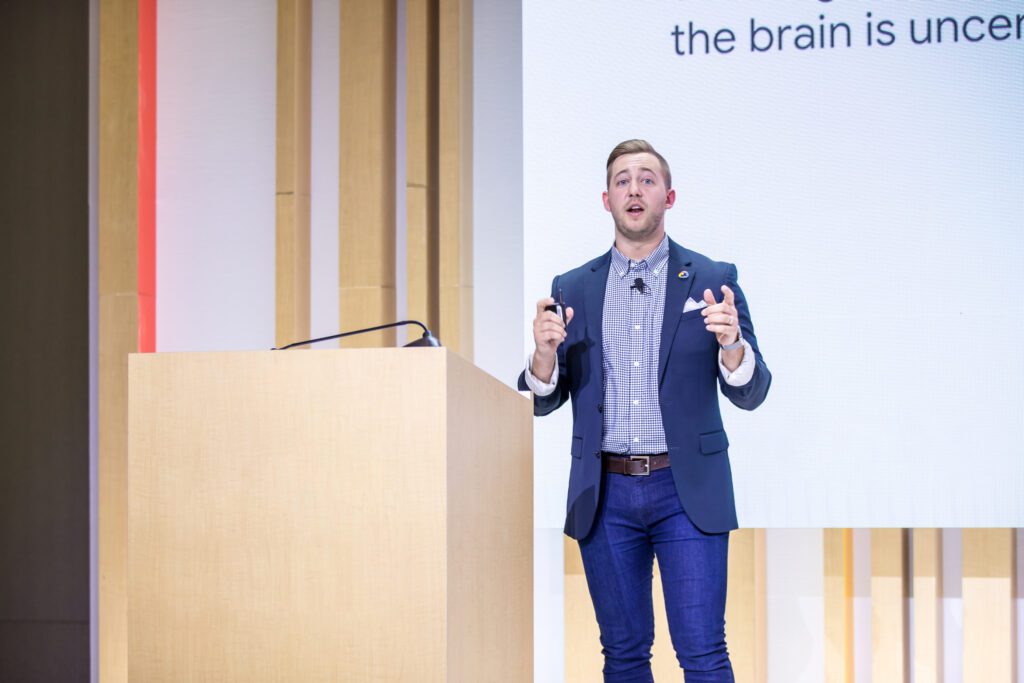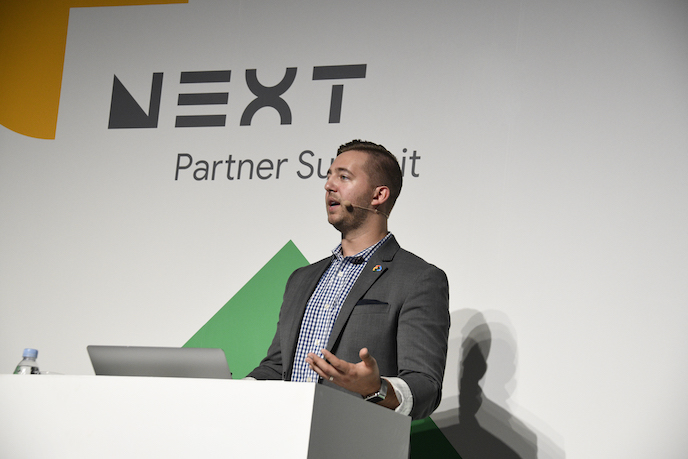
‘Neurological Nomad’ brings insight from leading change at Google to WIN in Workforce Summit
- September 21, 2022
Travis Hahler lives in a world of constant change.
The Webster native and USD graduate – class of 2010 and 2012 – leads global change and transformation for Google, while based in South Dakota.
But Hahler is an entrepreneur, too, who is building his organization, The Neurological Nomad, into a powerhouse resource for businesses looking to drive change with people at the forefront.
In just a decade, Hahler has built an impressive resume working with more than 100 companies around the world, including 40 percent of the Fortune 100 list.
On Oct. 26, he will be a keynote speaker at the fifth annual WIN in Workforce Summit, which runs from 9 a.m. to 3:30 p.m. at the Sioux Falls Convention Center.
We caught up with Hahler for a preview.
First, congratulations on your success. What is it about your work that you think has helped you distinguish yourself so early in your career?
Thank you so much. I’m proud of the work I’ve done so far, but I am far from finished.
In terms of distinguishing myself, I think the biggest differentiator has been my perspective and unique point of view. I see a lot of really smart people with singular backgrounds like MBAs, psychology, neuroscience, but having all three creates a fuller view of things that others without that exposure wouldn’t be able to see. That perspective has allowed me to anticipate the needs of employees and leaders, empathize with their experiences, draw incredibly accurate conclusions about their actions and motivations, and be able to articulate all of that to leaders in a language they understand. The piece of all of this that has distinguished me the most is then being able to take that perspective and build tactical plans that seemingly anticipate employee reaction and employee needs while also taking into account the larger environment that the employee is living in at that moment.
What will the theme of your keynote be at the WIN in Workforce Summit?
The theme of the keynote goes hand in hand with the mission of The Neurological Nomad, which is to help today’s leaders leverage neuroscience, neuropsychology and human behavior to design employee-centric organizations and drive transformational change. So what that is going to look like for the WIN in Workforce Summit is first a discussion about neuroscience and the impact that our human physiology has on our behavior, and then we are going to talk about how we leverage that information in business and at our organizations. It’s my goal to help the audience see that neuroscience and behavioral psychology is the bridging point between successfully meeting their business goals and objectives, their workforce goals and objectives, and the desires and goals of their employees.
If I’m a CEO, do I really need to know much about neuroscience?
I think all incredible leaders need to understand people, and there are really two ways that incredible leaders can get to that level of understanding. The typical way a leader learns to understand people is through experience working with them. This is very surface level and built through years of experiences and trial and error. After that, you can probably guess what your organization’s reaction to something will be based on previous reactions over similar situations you’ve seen, or you’ll be able to categorize people’s motivations and ways of working based on other people that you know who are similar or exhibit similar styles. You understand what happens, but you don’t understand why. You can still be a great leader with this type of understanding.
I’m sorry to all the leaders that became great through this method because neuroscience is a shortcut and a multiplier all at the same time. Neuroscience explains the “why” behind people’s behavior. So if you understand neuroscience, you understand people. You’ll be able to do all of the same things I just mentioned in a fraction of the time. What’s even better is that you don’t even need to know someone in order to understand how they will likely react if you understand neuroscience. Understanding neuroscience is a fast track to becoming an incredible leader and understanding people.
Are there some basics that can help me shift my thinking and see an impact with my workforce?
Absolutely, and that is why I do what I do. Neuroscientists don’t publish research that is simple to understand, so I view my job as an interpreter between science and business with regard to neuroscience and behavioral psychology and make it simple. The benefit that you get when learning theory about neuroscience is that it can be both theoretical and experiential at the same time because neuroscience dictates how you react as well as how others react. So, as you learn, you can also reflect on personal experiences and see how neuroscience or neurology influenced that reaction and the reasons you reacted as predicted or the reasons you didn’t.
What can neuroscience tell us about what motivates people? Does that directly tie to workforce attraction and retention?
There is a lot out there about motivation and the brain, but I think it’s deeper than that. What neuroscience tells us about humans is that from our humble beginnings, we have sought safety and security. First, it was from the wild, and now it is what most people would call “stability.” Our brain is wired for that. When we think about attraction and retention for employees, the quickest way to get a bad reputation and for your employees to start leaving is by creating an unstable environment in the workplace and triggering your employees to seek stability.
I don’t want to give too much away because we will explore what those trigger points are and ways to overcome them during the keynote, but here is what I will say: This is going to be exceptionally important as our world continues to change at a greater velocity than ever before. Stability will need to shift from the idea that “I’ve been here for many years, and I know it is the same day to day, and that provides me stability” to “I know my leaders and the way that they have taken my well-being and needs into consideration every time we change or transform and that provides me with stability.” It’s incredibly different from what we have traditionally seen for our workforce, and I believe neuroscience is the key to helping our leaders where they need to be for this shift to happen.
What are some of the common or most compelling issues that you’re hearing from the businesses you work with through The Neurological Nomad? Are there any emerging issues?
As I’ve been talking with different organizations and leaders, there are certainly a few things that I am hearing across the board. The first, and this has been for a while, is the rate of change as companies race to embrace digital transformation and prepare their organizations for what is next and their future. Second, employee retention and attraction. Finally, social justice, diversity and employee wellness.
The common string among all of these is how we operate and understand our employees. I think there has been a long time where employers have been promising certain things and failing to execute on those promises, and the Great Resignation was simply the result of a loss of trust in their employer. We need to rebuild that trust and create organizations that put employees first, not just write it on our corporate values on the website. I’m sure this isn’t a shock to you, but neuroscience is a huge part of making that happen.
What’s the most common mistake or oversight you see companies make when it comes to trying to implement change?
I think the biggest oversight I see is that organizations don’t understand their people and their people’s skill sets. This often leads to the organization not realizing the benefits of the change because their people were not prepared to operate in the new environment. I see this with companies that are going through digital transformation journeys a lot.
Often, organizations also try to do too much too fast. This is usually the result of an organization that hasn’t been proactive about advancing or in industries that haven’t been disrupted in a while. The ROI is rarely realized because people are too overwhelmed with change and not given an opportunity to internalize the new ways of working.
There is also usually a major disconnect between what leadership thinks their organization’s culture is and what it actually is and the maturity of that culture. What happens here is that leaders will often leave out critical engagement opportunities during the change process because “that’s just part of our culture” when in reality it’s not or it’s not mature enough yet to lean on it.
The good news is that we are going to talk about all of this during the keynote, and neuroscience has a lot to say in these areas!
What’s the biggest takeaway you hope the Sioux Falls audience has from hearing your keynote?
We have a lot of incredible people here in South Dakota and many great companies that either exist or will exist. My hope is that this will help our business leaders transform their organizations to either become people-centric or improve their people-centricity. I believe this is essential to being able to future-proof our South Dakota organizations and continue to grow, compete nationally and attract more great businesses to our state.
Is there anything else you’d like to add?
I would add just two things.
First, you are not alone in this journey. Building and growing a people-centric business is tough and complex, but I believe in what neuroscience and psychology have to offer and the ways that it can transform organizations. You’re not going to leave a 60-minute session and have all the answers, and if you need a partner in your journey, reach out to me at The Neurological Nomad.
Second, I’m so honored to be given the opportunity to speak at a South Dakota-based conference. I have spoken at hundreds of conferences and events but never one in South Dakota, so I am really excited to be a part of the WIN in Workforce Summit, and I hope you’ll join me there.
Register today
The Sioux Falls Development Foundation is an approved recertification provider for the Society for Human Resource Management, and human resources professionals who attend WIN can earn nine professional development credits.
Tickets are $89 for in-person attendance, which includes lunch and snacks, and $20 for virtual attendance. Group discounts are available. Contact deniseg@siouxfalls.com.

